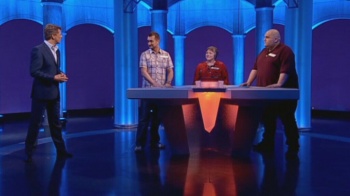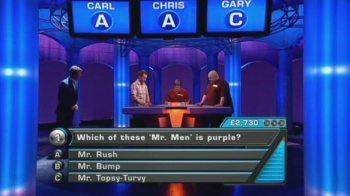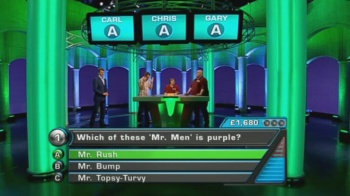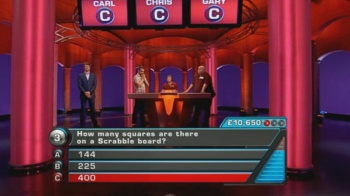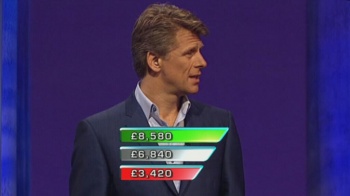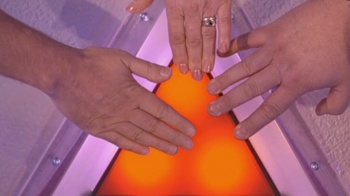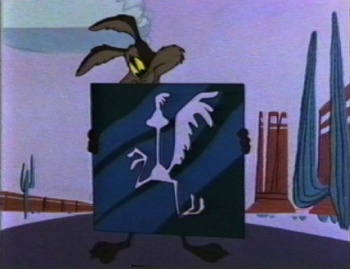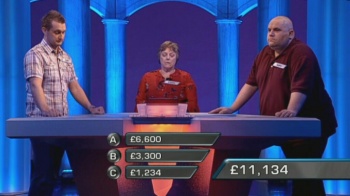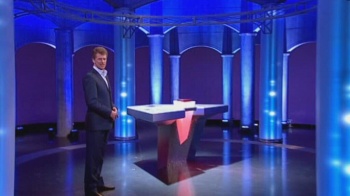Weaver's Week 2009-05-31
m (1 revision) |
UKGameshows (Talk | contribs) |
||
| Line 1: | Line 1: | ||
[[Weaver's Week 2009-05-24|Last week]] | [[Weaver's Week|Weaver's Week Index]] | [[Weaver's Week 2009-06-07|Next week]] | [[Weaver's Week 2009-05-24|Last week]] | [[Weaver's Week|Weaver's Week Index]] | [[Weaver's Week 2009-06-07|Next week]] | ||
| - | <div class= | + | <div class=square> |
[[Image:Divided_logo.jpg|100px]] | [[Image:Divided_logo.jpg|100px]] | ||
</div> | </div> | ||
| Line 123: | Line 123: | ||
Lakeland Radio in Penrith has been fined £15,000 for deliberately picking losers in a phone-in contest. The modus operandi was simple: listeners were invited to call or SMS in with their guess to the identity of a mystery celebrity. The presenter called back a listener, and a correct answer won the prize. An incorrect answer caused the contest to roll on, and another £5 be added to the prize. One listener smelled a rat after entering the contest every day, yet never receiving a call-back: given the small size of the station's audience, he reckoned this was statistically impossible. And it was; Lakeland had been screening the answers, and only selecting people they knew were losers. Lakeland is only a small station, with audiences of 15,000, and its fine per listener is comparable to the £1.1m given to GWR last year. | Lakeland Radio in Penrith has been fined £15,000 for deliberately picking losers in a phone-in contest. The modus operandi was simple: listeners were invited to call or SMS in with their guess to the identity of a mystery celebrity. The presenter called back a listener, and a correct answer won the prize. An incorrect answer caused the contest to roll on, and another £5 be added to the prize. One listener smelled a rat after entering the contest every day, yet never receiving a call-back: given the small size of the station's audience, he reckoned this was statistically impossible. And it was; Lakeland had been screening the answers, and only selecting people they knew were losers. Lakeland is only a small station, with audiences of 15,000, and its fine per listener is comparable to the £1.1m given to GWR last year. | ||
| - | <div class= | + | <div class=square> |
[[Image:Square ITV.jpg]] | [[Image:Square ITV.jpg]] | ||
</div> | </div> | ||
Revision as of 14:00, 22 December 2009
Last week | Weaver's Week Index | Next week
Contents |
The Despicable Factor
No, we're not reviewing a show in which Dick Dastardly, Wile E Coyote, and the Hooded Claw battle to find which is the nastier cartoon villain. It just feels like it.
Divided
Talpa TV / Brighter Pictures (an Endemol company) for Granada and other franchises (but not Scottish or Grampian), 5pm weekdays from 19 May
| Remember Andrew Castle? He was the Great British Hope for tennis success in the late 1980s, an era when British interest at Wimbledon would only stretch past the first Thursday if there was a rain delay. An extensive rain delay. Anyway, he's since carved out a career on the TV-AM breakfast show sofa, and commentating as part of the BBC's extensive tennis coverage.
He's also hosted some daytime shows for Carlton. General knowledge / memory test Perseverance was an interesting diversion when it aired in 2005, and had far more going for it than Wogan's Perfect Recall. Now, Castle has been given an hour to give some money to three perfect strangers. Like another show airing after 5pm, they'll have to work as a team, but they'll all have the opportunity to leave with piles of money. The three contestants walk into the arena. It's built with pillars, almost like a Roman house. In the centre of this arena is a table. It's triangular, it's got three recessed screens, and it's got a big glowy red button on top. A big glowy triangular red button, to boot. All the action takes place at this table. | |
| There is a quiz, with progressively increasing amounts of money. Round one is five questions at £3000 a pop, round two has four questions at £7500, round three has three questions for £15,000, round four is two questions each worth £30,000, and round five's one and only question is worth £75,000. Astute readers will note that the total value of each round increases by £15,000, and the maximum possible prize is £225,000. The questions are multiple-choice, with three possible answers: some questions involve pictures, others ask the contestants to put responses in sequences, and others invite them to select the right (or wrong) answer or answers.
The contestants must agree on all their answers, and have one minute 40 seconds to reach that unanimity. But there's a catch. Each second the contestants spend debating and discussing runs down the question's value by 1%. In this quiz, time is money, literally. It's a catchphrase begging to be used, and we've never heard it. As we mentioned, the contestants must agree on each answer, and they get the remaining amount of money for a correct response. If they're wrong, their bank is halved, and three wrong answers mean they must stand down and leave with nothing. | |
| Where do the rounds come in to it? After each round, the contestants have the opportunity to stop and split the pot they've got. The decision to stop has to be unanimous: if they don't all agree to end the quizzing, play continues with the next round. All three players must touch the central button to lock in their answer. This looks clumsy: we'd either have one player doing it, or a smaller button for each player in the same space.
The graphics for this show are an absolute dream: they're clear, concise, and tell the story of the question and the show well. About the only thing we'd change there would be to use green lights for remaining lives, turning black when lost: the current black spots turning red isn't so intuitive. The pillars light up for correct answers, drip down as the money runs down, and aside from the opening and closing scenes, there are none of those mobile spotlights that all the unimaginative set designers are using at the moment. | |
| We're less impressed with the music: we find Marc Sylvan productions sound rather a bit samey, and we can't help but be reminded of the GET 100 stings and stabs. The set design isn't the best: we'd rather see screens displaying the contestant choices on the front of the desk rather than as airport display monitors that can only be seen in a long shot.
It would be natural and logical for the questions to be asked by Andrew Castle. However, this is an Anglia show, so logic can go hill-climbing in polderland. The questions are asked by Charlotte Hudson off of Topranko!. She interacts with the players in a Voice Of God way, but we can't help but think the show is a little over-staffed. Do we need both of them, when there's only really enough for one person to be occupied? Does the show really benefit from having "how did you feel when you got that wrong?" asked by a different person from "What is the capital of Mongolia?"? If nothing else, Andrew Castle does feel like a spare wheel during the question phase. | |
| By far the worst part of the show – including the endgame that we've yet to discuss – is the way Andrew gives the possible score after every single question. "They currently have £some," and a caption appears on screen, saying "£some". The host continues, "If they get this question right, they'll have £more", with the inevitable caption saying "£more". It's nicely aligned, the slanted edges line up, but we're not done yet. Andrew goes on, "But if they got it wrong, they'll be reduced to £half." And guess what the last caption says. To do this once or twice is excusable. To do it after every single question just drags the game out needlessly.
We're not convinced by the endless repetitions of the potential score. We're not convinced by the way that a question is left hanging after every single break. We were particularly not convinced by the way the first six shows contained precisely one game: the format is crying out for rollover games, starting on Tuesday and finishing on Wednesday. It was good enough for Blockbusters, and it's eventually become good enough for us. And we're not convinced by the call-and-lose contests just before every break. Especially one that asked "which of these words is spelled incorrectly: goat, camell, cow". Without spelling them out, how are partially-sighted viewers supposed to enter the contest? Aren't there laws to cover this kind of thing? | |
| References to other game shows abound. Losing money with time was an idea from The Chair, and the questionmaster out-of-vision (and in a teatime slot!) is pure 100%. There's a sniff of Without Prejudice? meets The Weakest Link here, as the panel decide who has done the most to get them here. Three lives is the essence of Fifteen-to-One.
If you're reading the Week in foreign parts, look out for Divided coming to a screen near you. Rights have been signed for Greece, Hungary, Israel, Macedonia, Malta, Romania, India, and the UAE. The format was a John de Mol invention (see also: Big Brother, Deal or No Deal, Survivor, The Mole...) and first aired in the Netherlands last year. The show was called "De Gemene Deler", which literally translates as "The common factor". The middle word sounds like "Gemeen", which means "nasty, dishonourable, double-crossing varmit". It's a pun in a foreign language, no wonder they've changed it for the British audience. There are a few other changes in our version from the original Dutch format: there, the questions are worth €5000, €10 000, €25 000, €50 000 and €250 000 in each round for a maximum prize of (er) €490 000, the first mistake only costs 25% of the bank, and there are 30 seconds for discussion over the play or stop question. We can see why the last change was made: it's usually a no-brainer whether to play on or not. | |
| Anyway, there is a final round, and this is where the show takes its original name, "the despicable factor". Once the team has elected to stop, or answered all fifteen questions, they'll have to split the money. Here, the producers are in control. They've elected to make the shares very uneven, roughly in a 6:3:1 ratio. That ratio isn't going to change. The players have fifteen seconds to explain themselves and choose one of the slices, based on how they reckon they've done in the game so far. To win the prize, each player must choose a different slice. Should each player choose a different slice in the original shake-up, then the game finishes.
However, if two of them go after the same slice, the cash starts to drift away, at the rate of 1% per second before they can lock in a unanimous answer. Will one of the contestants be so stubborn as to refuse to back down? Will someone quickly conclude that 22% of £dosh is worth more than 66% of £notalot and take a lesser amount? Will Andrew Castle gloat at the person who accepts the smallest slice? Will Dick realise that the best way to win is just to put his foot down and not bother with the booby traps? Will Sylvester realise that there's no point explaining his contraptions to the Ant Hill Mob, they'll just use the time to escape? Will we find an excuse to use that picture of Wile E Coyote again? | |
| Now, we quite deliberately didn't see the first episode (for values of "quite deliberately" that include "completely forgot to set the video"), and the two episodes we saw when writing this review had very quick final rounds. Apparently, some of the other episodes have had a lot of screeching, a lot of shouting, some bad blood. We've only seen one example of this, and it brings to mind another motto from cartoons: so not the drama.
The shouting and ill-feeling is entirely constructed by the producers. It's yer traditional de Mol format: construct a scenario in which people will shout at each other, or attempt to diddle each other out of money, and film them shouting or diddling each other out of money. See also: Big Brother, Deal or No Deal, Survivor, The Mole... The producers want us to take sides. They want the audience to form their judgement of who has a greater Despicable Factor of the panelists. They want us to shout at our televisions, to get emotionally involved with their little game. Pass the nailfile. Seriously, we don't reckon the final round tells us very much novel about the human condition: people are conditioned to want a larger share than the next man, even if this is a larger share of a much smaller pot. Such is the culture promulgated through society in recent years. We reserve the right to think about this point some more, and come back in a week or two. | |
| Back to the game. The entire splitting of the pot should take no more than five minutes, including the explanation. That means the show divides into three unequal parts. Six parts a decent and well-constructed quiz, with entertaining and taxing questions that do increase in difficulty and a very good scoring gimmick. Three parts blatant filler as Andrew Castle explores every possibility and we wonder whether it's Sonali or Adam on Newsround today. And one part blitheration to split up the prize, or what's left of it. Remove the filler, make it eight parts quiz, and we might start watching more than the odd episode here and there.
Does Divided have the despicable factor? Not really. It's got an actual quiz, which lifts it far above Golden Balls, and does at least concentrate the bickering into a very short (but very noxious) few moments. It's almost an amiable quiz, before baring its teeth in the final round. |
Mastermind
Second round, programme four
This series began on 5 September last year, in the midst of the year's greatest flood. We've watched the show in sub-zero temperatures, in a howling gale, and with six inches of snow outside. It's now the end of May, and we're sitting on our balcony, watching television in the warm evening air of the hottest day since last July.
Frank Minns begins the show this week with the Life and Works of Mozart. Readers may remember him from the various classical works he wrote in the late 18th century. The round begins with one correct and two incorrect answers, and never particularly recovers; the final score is 8 (5).
Jenny Dunn will discuss the Ghost Stories of M. R. James. We confess to knowing nothing about Mr. M. R. James until now; a quick piece of research shows that he was an English writer and academic, active in the early part of the 20th century, whose speciality was the traditional ghost story. This round begins with an incorrect answer, and it's slow going to the final score 10 (3).
Gary Grant has the Planets of the Solar System. Readers will remember these as the wanderers of Greek myth, plus later discoveries Neptune, and traditional schoolboy joke Uranus. The round begins by explaining why there's little about Pluto (the International Astronomical Union doesn't recognise it as a planet any more) and there's something about all of the planets in the round. The final score is 13 (2).
Our last contender is Roger Canwell, who will take the History of Norwich City FC. Attentive readers will recall that questions have previously been asked on this subject, when 2004 Junior Mastermind champion Daniel Parker challenged Blue Peter presenter (and Norwich fan) Simon Thomas. There's a mention for Norwich's UEFA Cup campaign of 1993, involving Bayern Munich and Internazionale, before the round ends on 12 (2).
Mr. Minns qualified with Italian Politics 1944-94. Rather than discuss Herr Mozart, Mr. Minns discusses the environmental impact of turning front gardens into drives, and suggests that vegetables will be the next growth area. Though he doesn't get the first question right, he quickly finds his rhythm, and ends on 17 (9).
Jenny Dunn won the very first heat with Edward IV. She's asked, what makes a good ghost story? The atmosphere; something comes into the plot, it needs to be creepy without being graphic, and it's got to all be in the mind, not explained on the page. We will politely recommend a brief view of Blast Lab to explain Newton's Third Law of Motion. There are some very good guesses, a strong run at the end, and the final score is 19 (10).
Mr. Canwell had the Late Stuart Age 1660-1714 in his heat. Apparently, there are other celebrity fans of Norwich, including the celebrity chef Delia Smith. Since this programme was recorded, Norwich has been relegated to the third level of English football. Actually, we're not sure Norwich weren't in the top flight when this show was recorded... A good start falls down a little. We reckon that an early resort for question writers seeking an extra question is the recent renaming of some Indian cities, and Mr. Canwell nails his, to finish on 21 (5).
Dr. Grant rode to victory with Jackie Stewart. He discusses the demotion of Pluto from planet to sub-planet, and points out that this has really annoyed the scientists who sent a probe to explore the last planet, only to find that it had been deemed an Unplanet before it got there. We're impressed that he remembers the trivia that John Major was turned down for a bus conductor's job for being too tall. The round starts brilliantly, but he tumbles headlong into the Great Pass Spot, and comes to an end on 19 (9).
Mr. Canwell will therefore take Norwich to the final.
This Week And Next
Lakeland Radio in Penrith has been fined £15,000 for deliberately picking losers in a phone-in contest. The modus operandi was simple: listeners were invited to call or SMS in with their guess to the identity of a mystery celebrity. The presenter called back a listener, and a correct answer won the prize. An incorrect answer caused the contest to roll on, and another £5 be added to the prize. One listener smelled a rat after entering the contest every day, yet never receiving a call-back: given the small size of the station's audience, he reckoned this was statistically impossible. And it was; Lakeland had been screening the answers, and only selecting people they knew were losers. Lakeland is only a small station, with audiences of 15,000, and its fine per listener is comparable to the £1.1m given to GWR last year.
Many decades of history came to an end this week, with a not-entirely unexpected announcement from ITV. The company says that it will be exploiting new revenue streams and corporate syzergys (bless you!), and will henceforth be known as The Simon Cowell Channel. "It's a perfect fit," said a TSCC spokesmonkey, "he embodies everything that viewers love about our productions." When someone pointed out that the only things viewers watch on the channel are Simon Cowell productions, the monkey said, "Exactly!"
Over on the blue wire, we hear about some bad feeling involving Pop Idleus, and something called "power texting". Supporters of candidate C claim that fans of candidate J were given hints on how to send ten SMSs with the push of one button. Furthermore, the supporters of candidate C claim that, if the SMS voting had not been distorted in this way, their man would have won, not candidate J. If this sort of thing is possible, the BBC's refusal to count SMS votes at the Eurovision Song Contest starts to make sense.
Speaking of which, we have viewing figures for the week to 17 May. Though Britain's Got Talent still topped the game show ratings, with 11.1m viewers, that's almost 2.5m down on last week. The Apprentice took 8.5m, and the Eurovision Song Contest 7.9m on BBC1, and a chart-topping 115,000 on BBC-HD. All-Star Mr and Mrs had a year's best 4.95m earlier on ATV. The Apprentice You're Fired was biggest on BBC2, with 3.7m; Sunday night Come Dine With Me on C4 had a year's best 2.95m. There were also good scores for Great British Menu (2.4m) and Rolf's turn on Have I Got A Little Bit More News For You (2.3m).
The impact of Eurovision was felt on the digital tier: the Britain's Got More Talent Auditions lost almost 600,000 from last week, finishing at 1.165m; the Sunday repeat had a year's best 1.225m viewers. Come Dine With Me on More4 cocked a sneer at its recent low performances, with 1.04m seeing Sunday's conclusion. Hannah-Oke arrived on Disney, seen by 190,000 screaming fans. Though the song contest's semi-finals missed BBC3's top ten programmes, Eurovision did make one channel's list: UKTV Watch repeated Boom Bang-a-Bang from 2006, and 140,000 people wondered who the bloke in the wig was.
We said last week that our next Eurovision engagement would be the Dance Contest in September. Slap our wrists: there will not be a dance contest this September, because not enough broadcasters are interested in it. The pro-celeb version was far less compelling than the professional dancers in 2007.
Coming up this week, Joe Calzaghe takes on some no-hoper in Beat the Star With Vernon Kay (TSCC, 6.45 Sunday) We've the final of Counterpoint (Radio 4, 1.30 Monday) and the first in a new series of Big Brother (C4, 9pm Thursday). Next Saturday sees something for all tastes: BBC Cardiff Singer of the World (BBC2, 4.30 (Wales 6.15)), Totally Saturday (BBC1, 7.30), and I'm a Celeb Overseas (TSCC2 and TV3, 9pm).
To have Weaver's Week emailed to you on publication day, receive our exclusive TV roundup of the game shows in the week ahead, and chat to other ukgameshows.com readers sign up to our Yahoo! Group.


